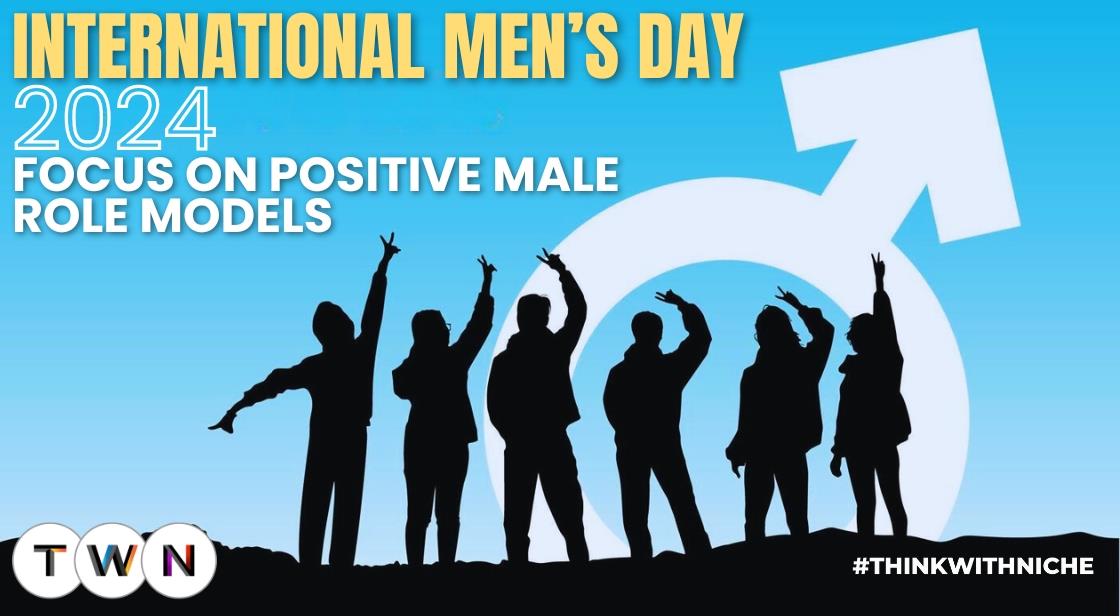International Men’s Day 2024 Focus on Positive Male Role Models

Blog Post
International Men’s Day (IMD) 2024 is a celebration of the positive contributions of men to society and a reflection on their roles as change-makers, caregivers, and leaders.
Observed annually on November 19, this significant day highlights the importance of addressing men’s mental health, breaking down harmful stereotypes, and promoting gender equality.
The theme for 2024, "Positive Male Role Models," emphasizes the need to celebrate men who inspire through their actions, values, and dedication to building a better, more inclusive society.
In today’s world, where discussions about equality and inclusivity often dominate the global stage, it is vital to recognize and appreciate the unique challenges men face.
Whether it’s addressing societal pressures, redefining masculinity, or supporting emotional well-being, International Men’s Day serves as a platform to promote conversations about men’s holistic development.
This year's theme also calls attention to the role of mentors, educators, public figures, and everyday heroes in shaping the next generation of responsible and compassionate men.
This blog delves into the essence of International Men’s Day 2024, exploring its history, the importance of role models, and their impact on personal growth and societal progress.
It also sheds light on how educational institutions, media, and community initiatives play a crucial role in nurturing positive male role models, ensuring that their influence helps shape a brighter future for everyone.
International Men’s Day 2024 Celebrating Positive Masculinity and Contributions
International Men’s Day (IMD) is celebrated annually on November 19 to recognize and honor the contributions of men to society. It was first celebrated in 1999 and has since gained global recognition. IMD aims to raise awareness about men’s well-being, celebrate positive male role models, and highlight issues such as men’s mental health, fatherhood, and the challenges men face in society.
While International Women’s Day often takes the spotlight, IMD serves as an important day to reflect on gender equality and the positive aspects of masculinity.
Importance of Positive Male Role Models
The theme of International Men’s Day 2024 focuses on the importance of positive male role models. Positive male role models are individuals who exhibit strong moral values, compassion, resilience, and leadership. These men not only influence the lives of those around them but also serve as examples of healthy masculinity, encouraging younger generations to embody these values.
In today’s society, where negative portrayals of men in media and culture can sometimes dominate, it’s crucial to celebrate role models who contribute positively to their communities and families.
By emphasizing positive male role models, IMD aims to challenge harmful stereotypes, promote mental and emotional health among men, and encourage men to step up as leaders, mentors, and caring individuals in their personal and professional lives. Recognizing such role models helps in shaping a more inclusive and balanced society for all.
International Men's Day History
International Men's Day was first established in 1992 by Trinidadian scholar Dr. Jerome Teelucksingh. He envisioned a day dedicated to recognizing the accomplishments and contributions of men, while also raising awareness about key issues such as male health, gender-based violence, and the importance of positive male role models. The concept gained widespread support across the globe, with many countries adopting the day as an opportunity for celebration, reflection, and advocacy through various events and awareness campaigns.
International Men's Day 2024 Theme and Date
International Men's Day is celebrated every year on November 19, and in 2024, it will take place on a Tuesday. The theme for this year, "Positive Male Role Models," emphasizes the significance of promoting open discussions about men's mental health and building supportive spaces that enable men to flourish.
2. The Significance of Role Models
Role Models as Catalysts for Change
Positive male role models play a crucial role in shaping societal attitudes and behaviors. By embodying values such as integrity, compassion, and resilience, they help challenge stereotypes about masculinity and promote healthier perspectives. These role models inspire young men to embrace these qualities and make responsible choices, influencing their peers and communities. When public figures or community leaders demonstrate positive behavior, they can shift cultural norms, encouraging others to follow suit. Through their actions, role models can spark broader social changes, fostering a society where respect, empathy, and equality are prioritized.
Impact on Personal Development
Male role models significantly contribute to the personal growth and development of young men. They provide guidance, wisdom, and inspiration, helping individuals navigate challenges in their personal and professional lives. Positive male role models teach essential life skills, such as emotional intelligence, resilience in the face of adversity, and the importance of hard work and perseverance.
Their influence can also encourage self-confidence and healthy self-expression, providing young men with the tools they need to build strong character. Furthermore, role models who prioritize mental health and emotional well-being help normalize these important aspects of personal development, allowing individuals to seek help and embrace vulnerability without shame.
Ultimately, these role models shape the future of young men, helping them grow into well-rounded, compassionate individuals.
Also Read: International Day of Friendship 2024: A Tribute to Global Bonds
3. Defining Positive Male Role Models
Qualities of a Positive Role Model
Positive male role models embody qualities that inspire and uplift others, contributing to a healthier, more inclusive society. Some key traits that make someone a positive role model include:
-
Empathy: Understanding and sharing the feelings of others. A positive role model listens, shows compassion, and offers support when needed.
-
Resilience: The ability to bounce back from adversity and maintain a positive outlook, even in challenging situations. This trait inspires others to persevere through difficult times.
-
Integrity: Acting with honesty and strong moral principles, even when faced with difficult choices. Integrity builds trust and respect, which are essential for being a positive influence.
-
Compassion: A genuine concern for others' well-being and a desire to help. Compassionate role models take actions to improve the lives of those around them.
-
Accountability: Taking responsibility for one’s actions and decisions. This shows others the importance of being responsible and owning up to mistakes.
-
Leadership: Leading by example and motivating others to reach their potential. A positive role model empowers others to grow and make a positive impact in their own lives.
Diversity of Role Models
Positive male role models come in various forms, demonstrating that greatness is not confined to a single domain or type of individual. They can be:
-
Fathers and Mentors: Everyday men who influence their families and communities, teaching values such as respect, love, and responsibility.
-
Athletes: Professional athletes who demonstrate dedication, discipline, and the pursuit of excellence, while using their platform to advocate for social issues.
-
Activists: Men who fight for social justice, equality, and human rights, showing the importance of standing up for what’s right.
-
Public Figures: Leaders in politics, business, and entertainment who use their visibility to inspire and guide others toward positive change.
4. Impact of Positive Male Role Models on Society
Promoting Gender Equality
Positive male role models play a crucial role in breaking down traditional gender stereotypes and challenging toxic masculinity. By embodying qualities such as respect, empathy, and equality, they model behavior that encourages men to value women as equals and promote shared responsibilities in relationships, work, and family life.
These role models help dismantle harmful beliefs like "men must always be dominant" or "emotion is a weakness," paving the way for a more inclusive and gender-equal society. Their actions and words can inspire men to adopt a healthier view of masculinity, where power dynamics are balanced, and mutual respect is central.
Encouraging Emotional Expression and Mental Health Awareness
Many positive male role models openly discuss their struggles with mental health, setting an example that emotional expression is not only acceptable but necessary for well-being. This openness helps reduce the stigma surrounding men’s mental health, encouraging others to seek help when needed.
These role models emphasize the importance of vulnerability, demonstrating that true strength lies in being honest about one's emotions and seeking support when required. By championing emotional awareness and mental health care, they contribute to the creation of a society where men can freely express themselves without fear of judgment.
Inspiring Responsibility and Leadership
Positive male role models also inspire men to take responsibility in their personal, professional, and social lives. Whether through active parenting, community service, or ethical leadership in the workplace, these individuals demonstrate that leadership is rooted in integrity, accountability, and compassion.
Their actions motivate men to embrace roles of responsibility, whether at home, in their careers, or within their communities, fostering a generation of men who lead by example and contribute meaningfully to society.
5. Examples of Positive Male Role Models in Various Fields
In Sports: Athletes as Role Models for Positive Change
Athletes have immense power to influence society, and many use their platform to promote positive values like teamwork, perseverance, and social justice. For example, football players like Marcus Rashford have used their fame to advocate for child food poverty in the UK, while Colin Kaepernick took a stand against racial injustice by kneeling during the national anthem. Their actions inspire millions, showing that sports figures can push for change beyond the game.
In Politics and Activism: Male Leaders Driving Equality
Male leaders in politics and activism also serve as influential role models. Barack Obama, the former president of the United States, championed equality, healthcare reform, and racial justice. Meanwhile, figures like Malala Yousafzai’s father, Ziauddin Yousafzai, have been instrumental in advocating for education and women’s rights in Pakistan. These men demonstrate how political power can be used to create social change and challenge inequities.
In Arts and Entertainment: Using Fame to Promote Inclusivity
Many male actors, musicians, and artists leverage their visibility to send positive messages about inclusivity and diversity. Will Smith, known for his wide-reaching impact in Hollywood, promotes mental health awareness and positivity. Musicians like John Legend use their platform to address racial injustice and promote humanitarian causes, exemplifying how public figures can use fame to foster a more inclusive world.
In Everyday Life: Local Heroes as Everyday Role Models
In everyday life, local heroes like teachers, fathers, and community leaders set remarkable examples. Men who support family values, lead mentorship programs, and actively participate in their communities demonstrate leadership and responsibility in practical ways. These everyday role models are essential in shaping the next generation, fostering values of compassion, responsibility, and integrity.
6. Challenges in Recognizing Positive Male Role Models
Underrepresentation and Stereotypes
-
Societal Biases: One of the key challenges in recognizing positive male role models is the societal bias that often limits the types of men who are celebrated. Traditional views of masculinity, such as the expectation for men to be stoic, dominant, or emotionally distant, often overshadow more inclusive traits like empathy, vulnerability, and cooperation. As a result, men who do not fit these rigid expectations may be overlooked as role models, even if they demonstrate positive behaviors and values.
-
Media Portrayals: The media plays a significant role in shaping public perceptions of male role models, but often, the portrayal of men in popular culture focuses on hyper-masculine stereotypes or idealizes only a narrow spectrum of achievement, such as wealth or athletic success. This underrepresentation of diverse, positive role models in the media can make it difficult for young men to find relatable figures to look up to. It also reinforces the idea that only certain traits, such as physical strength or material success, define a worthy male role model.
The Need for Balance
-
Diversity of Experiences: It's essential to acknowledge that the concept of masculinity is multi-dimensional and should reflect a broader range of experiences. A balanced view of masculinity includes men who may express vulnerability, engage in caregiving roles, or advocate for social justice, alongside those who might be more traditionally assertive or competitive. The recognition of these diverse experiences allows young men to understand that there isn't a singular way to be a positive role model.
-
Inclusive Representation: By embracing a more balanced and inclusive definition of masculinity, society can better support young men in understanding their identities and aspirations. Recognizing diverse role models, from emotional caretakers to social change agents, enriches the narrative of what it means to be a positive male influence.
7. The Role of Society in Shaping Future Role Models
Society plays a crucial role in shaping future male role models, and two key areas that significantly influence this development are educational institutions and media, as well as mentorship and community initiatives.
Educational Institutions and Media
Educational institutions, including schools and universities, are foundational in shaping young minds. They offer not only academic learning but also social and emotional development, where boys can learn essential life skills. Teachers and mentors in these settings can set examples of positive masculinity by promoting values such as respect, empathy, and responsibility.
Additionally, media, including television, film, and social media platforms, plays a pivotal role in shaping perceptions of what it means to be a man. Positive portrayals of men in leadership, teamwork, and compassionate roles in media can challenge harmful stereotypes and encourage young boys to embrace a broader, healthier definition of masculinity.
Mentorship and Community Initiatives
Mentorship programs and community involvement are equally essential in developing positive male role models. When boys have access to mentors—whether through school programs, youth organizations, or community groups—they can learn valuable life lessons from men who embody integrity, resilience, and social responsibility.
These role models can guide young boys in making positive life choices and help them navigate challenges. Community initiatives also offer a platform for men to engage in social causes, fostering a sense of responsibility toward society and motivating young boys to contribute positively to their communities.
By investing in mentorship and community programs, society helps cultivate a new generation of men who will, in turn, inspire and guide future generations.
What is Positive Masculinity?
Positive masculinity refers to a healthy and inclusive approach to expressing masculinity, emphasizing traits and behaviors that uplift individuals and communities. It challenges traditional, restrictive stereotypes of what it means to be "masculine" and promotes qualities that benefit both men and society as a whole.
Key Aspects of Positive Masculinity:
-
Empathy and Compassion:
Positive masculinity values emotional intelligence, encouraging men to understand and empathize with others' feelings, fostering deeper and more meaningful relationships. -
Emotional Expression:
It supports the idea that men can openly express their emotions without fear of judgment, breaking the stereotype that "men must always be tough." -
Respect and Equality:
Men who practice positive masculinity respect everyone, regardless of gender, and advocate for equality in personal and professional spaces. -
Accountability and Integrity:
Taking responsibility for one's actions and being honest are central to positive masculinity, inspiring trust and reliability. -
Leadership Through Service:
Positive masculinity focuses on empowering others through mentorship, guidance, and community involvement, rather than dominating or controlling.
Examples of Positive Masculinity:
-
A father who supports and nurtures his children equally.
-
A leader who emphasizes collaboration and values diverse perspectives.
-
A man who speaks out against discrimination or gender-based violence.
Conclusion
International Men's Day 2024 serves as a powerful reminder of the importance of celebrating positive male role models and fostering healthy masculinity. By recognizing men who exemplify qualities such as empathy, resilience, and leadership, we pave the way for a more inclusive and balanced society.
These role models not only inspire personal growth but also contribute to breaking down harmful stereotypes and promoting gender equality.
As we honor the achievements and contributions of men, let us also continue to address the challenges they face, particularly in mental health and emotional expression.
By cultivating supportive environments and encouraging open dialogue, we can empower men to thrive as individuals and role models in their families, communities, and professions. International Men's Day is not just a celebration—it is a call to action to build a better, more equitable world for all.
You May Like
EDITOR’S CHOICE












